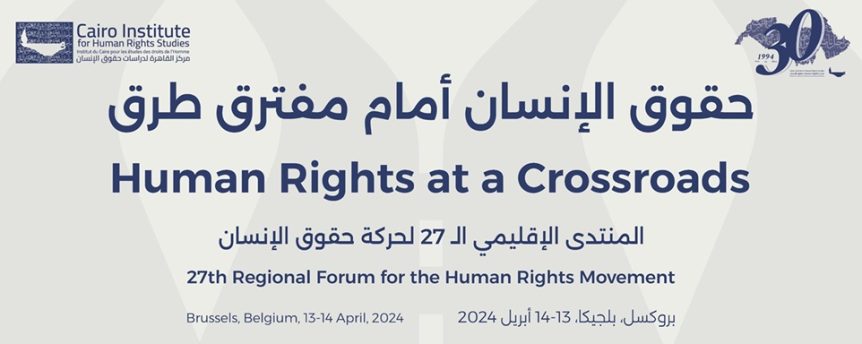Conclusions of the 27th Regional Forum of the Human Rights Movement
- The future of human rights in the Arab region faces a compounded crisis. On the one hand, the ability of the international community to provide immediate protection to Palestinians is constrained due to some Western governments’ political support of Israel. On the other, the power of authoritarian states (Russia, China, and influential countries in the Middle East: Saudi Arabia, Iran, the United Arab Emirates, and Egypt) continues to grow to weaken international human rights mechanisms. There has thus been a failure to put an end to serious violations against civilians in Syria, Sudan, Yemen, and against the Uyghur Muslims in China.
- Western governments discursively adopt the values of democracy and human rights while some of them support allied Arab authoritarian governments. Moreover, numerous Global South states adopt a principled position in support of the internationally legitimate rights of Palestinians, and in parallel, they overlook undermining international mechanisms for protecting human rights and dismiss the criminalization of human rights violations and accountability for such violations in most other Arab countries.
- The United Nations’ effectiveness will likely continue to wane with the intensifying polarization between the United States, Russia, and China and the continued inability of countries throughout the world to transcend polarization and raise the overall interests of humanity. This will reduce the role of United Nations to a merely humanitarian actor, especially considering a severe funding crisis, its dependence on the political will of influential member states, and the escalating geopolitical turmoil and the rise in popularity of right-wing and populist movements in the West. This will result in an increasing disparity between the concept of human rights values and the reality of their declining application.
- Ruling regimes in the Arab region perpetuate authoritarian rule, which is one of the most serious human rights challenges in the region. Israel’s genocidal war on Gaza has clearly reflected that, underlining the extent of the Arab peoples’ inability to show solidarity with Palestinians and their rights, or to object or protest against complicit policies of most Arab regimes in regards to this war; in contrast to the ongoing popular protests in many Western countries over several months.
- The depth of the crisis of the future of human rights in the Arab region goes beyond the problem of double standards adopted by countries of the Global South and Global North in varying forms.
- In the Arab region, the human rights movement suffers from structural challenges resulting from the circumstances of its emergence and the paths of its work over the past decades. This contemporary human rights movement arose on the margins of authoritarian regimes, after liberation from foreign occupation. These authoritarian regimes have restricted the complete liberation of their people and have instead subjugated them, directing all their efforts towards bolstering exclusion, nationalizing political action, and stifling the public sphere.
- The confiscation of political work has prompted many members of the opposition, including nationalists and leftists, to work in human rights, forming the first generation of the contemporary human rights movement in the late last century. The leftist and nationalist background of the first generation has had clear imprints on the development and ideologies of the movement. The human rights movement was at times complicity (on the basis of ideological or political motives) in serious human rights violations and crimes by Arab governments or military and non-military coups.
- The human rights movement later expanded in Arab countries, witnessing organizational and generational diversity that contributed to enriching its work and widening its international and local influence. To seize potential immediate human rights gains, this emerging human rights movement directed most of its focus towards addressing governments, whether their own and/or foreign governments, at the expense of addressing public opinion in their own countries, and cumulative work to create a pressure bloc. Over time, the human rights movement reaped some limited successes at the international and local levels as a result of its communication with governments. The limited harvest and the profound changes taking place at the level of the regional and international systems require a reconsideration of the nature of human rights priorities and strategies in the Arab region.
- Following the conclusion of the forum, 29 human rights defenders from several Arab countries held a special meeting to consider how the forum’s deliberations could be reflected in their work. These consultations will be followed up jointly at a later time.
* The forum hosted 50 human rights activists and academics from 10 Arab countries, Europe, and the United States.
Share this Post

